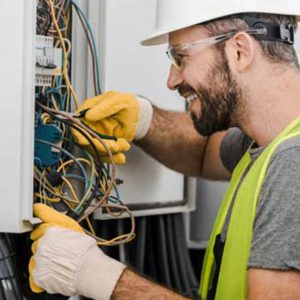Have you ever been in a dark room and wondered why the lights went out? Electrical issues happen more often than you think and can sometimes cause bigger issues. It’s important for every homeowner to know about these problems because they affect our daily lives and safety.
In this guide, we’ll look at why these problems happen and how to fix them. By the end, you’ll feel more confident managing your home’s electrical systems and knowing when to ask for help.
What Are Electrical Issues?
Electrical issues can range from flickering lights to frequent circuit breaker trips. These problems often arise from faulty wiring, overloaded circuits, or outdated electrical systems.
Even small issues can become major headaches if not addressed in time. It’s important to pay attention to warning signs.
Common Causes of Electrical Problems
Electrical issues can be both frustrating and hazardous. They impact the functionality and safety of your home or workplace. Here are some common causes of electrical problems:
Faulty Wiring
One significant cause of electrical issues is faulty wiring. Old or damaged wires can lead to short circuits. This might trip circuit breakers and could even cause fire hazards.
If your home has an outdated electrical system, it’s important to schedule regular electrical home inspections. These inspections help identify hidden dangers and ensure your home stays safe. Even if you’re new to understanding electrical systems, remember that these checks are crucial for preventing serious problems.
Overloaded Circuits
When too many devices are connected to a single circuit, it can become overloaded. This can cause flickering lights or even a power outage. To prevent this, consider distributing your electrical devices across multiple circuits.
Poor Connections
Loose or corroded connections can create resistance in your electrical systems, leading to overheating and potential electrical fires. A qualified electrical inspector can help identify and repair these issues.
Solutions to Electrical Issues
Dealing with electrical issues can be challenging, but understanding common solutions can help you tackle these problems safely and effectively. Here are some tips:
Regular Electrical Safety Inspections
Scheduling regular electrical safety inspections is vital for early detection of problems. An expert can assess your wiring, outlets, and overall electrical systems testing to ensure everything is functioning properly. Regular checks can save you money and stress in the long run.
Updating Electrical Systems
If your home is older and still uses outdated systems, consider upgrading. This process often involves installing new wiring, circuit breakers, and outlets. Upgrading your electrical systems ensures that they meet current safety standards and can handle modern electrical needs safely.
Hiring an Electrical Inspector
If you suspect any electrical problems, an electrical inspection is a must. Consulting with an electrical inspector can be beneficial in protecting your home. These professionals are trained to find and diagnose issues that may not be visible to the untrained eye, providing you peace of mind.
Addressing Electrical Issues Must Be Top Priority
Electrical problems might seem scary, but learning about what causes them and how to fix them can help you as a homeowner. Regular check-ups, timely inspections, and keeping things up-to-date can keep your home safe. Always tackle electrical issues as soon as they come up.
Did you like this guide? Great! Browse our website for more!




Be First to Comment